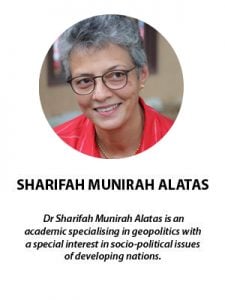
Most Malaysians have reason to be proud of Prime Minister Anwar Ibrahim’s speech at the 78th session of the United Nations General Assembly (UNGA).
Congratulations on a speech well-written and articulated, surpassing by far Malaysia’s UNGA performances of the recent past. Hopefully more Malaysians will have renewed trust and hope in the Madani administration.
In my opinion, the PM’s speech reinforced the country’s international reputation, and hopefully, will repair the nation’s global standing which has taken a brutal beating over the last few years.
It is clear that Anwar Ibrahim has a keen and intelligent ability to engage with the international media. This is comparable to only a few of our past prime ministers.
Furthermore, Anwar’s eloquence during Christiane Amanpour’s CNN interview a few days ago also suggests that the country is on its way to reclaiming a semblance of respect and dignity, lost over the last two premierships.
I would like to focus on a snippet of Anwar’s 19 minute UNGA speech calling for global understanding and respect for religious diversity, along with inter-religious, inter-civilisational and inter-cultural acceptance.
Anwar was probably referring to the recent Quran-burning fiasco in Sweden.
The Prime Minister’s call to unite different faiths under a common cause, i.e. to live in peace and harmony amidst diversity is a welcome one. However, statements made on international platforms such as the UNGA must be echoed loudly and consistently at home.
The key message that the Anwar Ibrahim administration must reiterate on Malaysian soil is the need for all Malaysians to “understand” and accept diversity. This can only happen if our “differences” are openly discussed from all possible angles.
How do we do this? Discussing difference from all angles means exposing Malaysians from a very young age to the different civilisations that have defined who we are as Malaysians.
For example, it is divisive and erroneous to declare Malaysian citizens of Indian or Chinese descent as “pendatang” or guests in the country, because they are citizens who have contributed to the country’s development and identity.
Our “Malaysian-ness” must obviously be linked to our Indian and Chinese heritage as well. The descendants of these two great civilisations have contributed immensely to the nation’s uniqueness and progress. Having said this, their contribution does not negate the contributions of other ethnic groups, civilisations and religions.
The Orang Asli, Malays, Arabs, Sikhs, Islam and Catholicism have all contributed to Malaysia’s unique national cocktail and development. The diverse religions and cultures of Sabah and Sarawak must never be ignored either.
It is unfortunate that under previous administrations, irresponsible politicians have pushed dangerous distortions of what it means to be Malaysian. Such distortions must be openly condemned by the Madani administration.
Similarly, anyone who utters such destructive rubbish must be publicly shamed and officially ridiculed, and even threatened with a fine or jailtime.
In the Malaysian context, an important gauge of understanding diversity is how much our younger population knows or is keen to learn about different religions and ideologies. For example, what can we teach school children about Hinduism, Buddhism, Sikhism, Shiism, Marxism, and all our other diverse belief systems, ideological and cultural traditions?
Furthermore, we should not shy away from knowing the many forms of indigenous music, dance, art and architecture in Malaysia, instead of passing infantile media statements (and fatwas) such as “music is haram”, or “Muslims should not visit non-Muslim places of worship”.
For example, there are synagogues in Kerala and Singapore. Malaysian Muslims should be encouraged and even praised for visiting either to learn about Judaism, the Jewish diaspora and the Hebrew tradition. A visit to a synagogue does not mean support for Zionism or indifference to the plight of the Palestinians.
Similarly, Malaysians should be exposed to various intellectual traditions. After all, we are geographically and historically situated in the Nusantara or Southeast Asia, the confluence of civilisational exchange over millennia.
All Malaysian primary schoolchildren should be taught about Christianity, Shiism, Socialism, Agnosticism and even Marxism. Exposing them to different religious traditions and ideologies in the classroom is not the same as indoctrination.
For example, why shouldn’t young Malaysian children learn about Socialism and Marxism, if we want them to understand why Labour Day is a federally sanctioned public holiday? Knowing about May Day is not the same as indoctrinating school children to believe that religion is the “opium of the people” (as Marx wrote).
A civilised leadership empowers the people to embrace differences so they can live in harmony and embrace diversity. A responsible prime minister would encourage the people to be confident and to have self-respect, so that the understanding and embracing of diversity becomes easier.
An education system that incorporates critical and fact-based learning about “the other” will nurture future Malaysians who are discerning enough to see through the evil intentions of bigoted and racist leaders.
No leader should use fear to govern a diverse population such as Malaysia.
For example, only a dictator who would want to remain in power indefinitely would keep nagging a people into thinking they were either lazy or “under threat” by those who were religiously and culturally different. Such a leader would drum up existential fear among the people, ultimately forcing them to surrender their “fate” to him or her.
This gives that leader insatiable and unlimited power to control a population. Such a scenario always ends in catastrophe for the entire nation.
This must not be the way of Malaysia Madani. - FMT
The views expressed are those of the writer and do not necessarily reflect those of MMKtT.



No comments:
Post a Comment
Note: Only a member of this blog may post a comment.